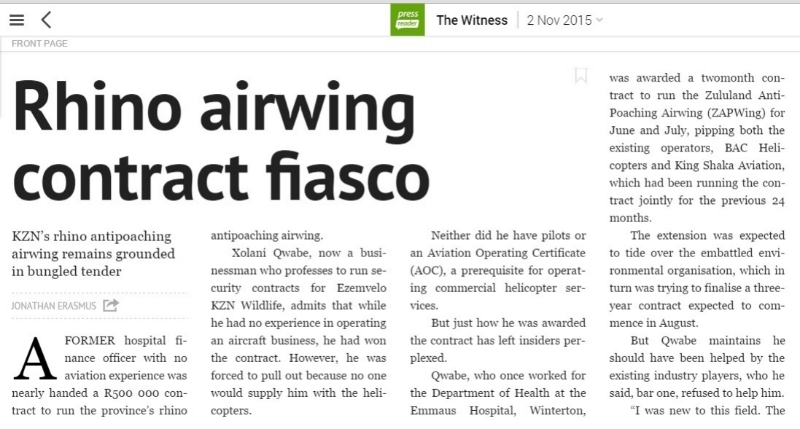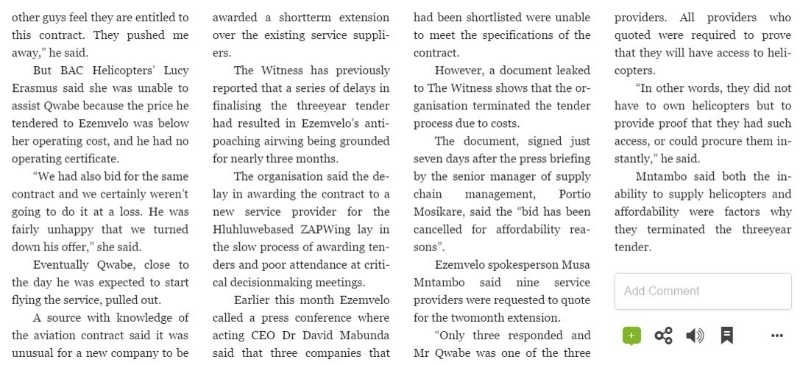http://www.news24.com/Green/News/KZN-rh ... r-20151005
KZN rhinos in danger
2015-10-05 12:36
Jonathan Erasmus, The Witness
Pietermaritzburg - Fears have been raised that bureaucratic bungling by Ezemvelo KZN Wildlife could be impacting on the province’s dwindling rhino population.
This as a rhino anti-poaching airwing unit has been grounded for two months as staff at the struggling provincial wildlife authority fail to attend key decision-making meetings to decide who should be the supplier of helicopters to be used to protect rhino.
Recently Ezemvelo came under intense scrutiny by the KZN Legislature due to its R213 million under-expenditure in the 2014/15 financial year, with the bulk of this under-expenditure being operational capacity.
At the time general manager Sudhir Ghoorah told the MPLs that the body was “sorry for letting you, the department and the public down”.
Just how many rhinos poached during this period as a direct result of the poor air support is, according to experts, difficult to quantify. There is, however, deep concern that the longer the status quo remains, the greater the risk profile to the Zululand region and its dwindling rhino population.
An insider into the anti-rhino operations said while the grounding has been kept out of the news, poaching syndicates were more than likely aware of the situation.
Ezemvelo KZN Wildlife spokesperson Musa Mntambo said the delay in awarding the contract to a new service provider for the Hluhluwe-based Zululand Anti-Poaching Wing (ZAP-Wing) lay in the slow process in awarding tenders and poor attendance at critical decision-making meetings.
“We are about to appoint a new provider fairly soon. This service plays a crucial role in our anti-poaching strategy. Without the air support it puts us under pressure and means we must rely on our other resources.
“The advantage of the air support makes it easier to spot poachers and rhinos,” said Mntambo.
He said the tender process is drawn out and requires three separate committees to sit before it is eventually finalised.
“First the specifications committee must meet, then the bid evaluation and finally the bid adjudication committee. Some of these committees have been delayed as they have failed to make a quorum,” said Mntambo.
Karen Holmes, the general manager of the Zululand Rhino Reserve — an amalgamation of 17 privately owned game farms near Mkhuze, said the lack of air support is a “huge concern” and could lead to an escalation in poaching.
“The longer the air service stays down, the greater the chance of more incursions into the reserve.
“In the past we could phone ZAP and within minutes we would have the required support. Now we must just rely on our ground support,” said Holmes.
Project Rhino KZN secretariat Sheelagh Antrobus said the lack of aircraft was “badly affecting the conservation community”.
“The tender process has been completely tied up by their procurement systems,” said Antrobus.
Antrobus flew to the USA this weekend to raise further funds for the anti-poaching programme in KZN.
Project Rhino was pivotal in the creation of ZAP-Wing by obtaining private funding while successfully lobbying the KZN Provincial Treasury in 2013 to release R74 million to Ezemvelo’s anti-poaching rhino war-chest.
ZAP-Wing fixed wing pilot Etienne Gerber said the helicopter contract lapsed at the same time that they lost their fixed wing aircraft.
“We had been using a demo plane provided to us by the company who were building us a new aircraft. However, the company needed us to return their plane about the same time as the helicopters became unavailable.
“In the interim we have been using the volunteer pilot service called The Bateleurs,” said Gerber.
Gerber is currently in Johannesburg to train on the new aircraft, a two-seater Skyreach BushCat.
The Bateleurs is a voluntary organisation, that primarily assists with air support for environmental causes.
In the last two months the NPO made several trips to Zululand and the KZN Midlands, providing air surveillance in the fight against rhino poaching.
During the recent full moon six more rhino carcasses were found in the Hluhluwe-Imfolozi Game Reserve. More than 750 rhinos have been poached nationally this year.
Ezemvelo said as at September 27, 64 had been poached in their parks, while a further 16 have been killed in private reserves in the province.
The air wing started in 2012 and provides support to 24 game reserves covering an estimated 300 000 ha in Zululand including both private and state owned parks. Previously they had two fixed wing aircraft and two helicopters at their disposal.
The planes were funded through private donors, while the contract for the helicopters was managed by Ezemvelo.
In May 2015 Ezemvelo put out a tender asking for companies to submit proposals to supply two new helicopters, but by the end of July, the then provider’s contract came to an end with still no appointment made.
Ezemvelo’s rhino security manager Cedric Coetzee said the extended lapse was unexpected.
“We had planned for a week [between service providers] but it is unfortunate that it has been a bigger gap,” said Coetzee.
He said alternative arrangements have been made, including support from the SAPS Airwing and the authority’s capture helicopter.
“We are hoping to get airborne quickly. It is difficult to say whether poaching has increased as a result.
“I would need to see the data before making that kind of judgement. Last week we also had the brightest moon in years and helicopters wouldn’t have made an impact.
“Air support does not stop poachers, but it goes a long way to increase the reaction time of ground teams and provides operation enhancements,” said Coetzee.


